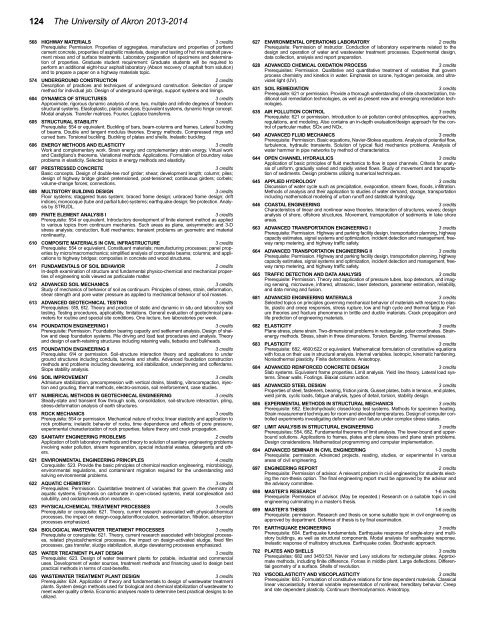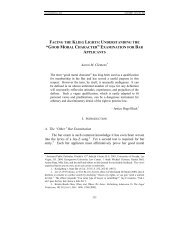2013-2014 GRADUATE BULLETIN - The University of Akron
2013-2014 GRADUATE BULLETIN - The University of Akron
2013-2014 GRADUATE BULLETIN - The University of Akron
Create successful ePaper yourself
Turn your PDF publications into a flip-book with our unique Google optimized e-Paper software.
124 <strong>The</strong> <strong>University</strong> <strong>of</strong> <strong>Akron</strong> <strong>2013</strong>-<strong>2014</strong><br />
568 HIGHWAY MATERIALS 3 credits<br />
Prerequisite: Permission. Properties <strong>of</strong> aggregates, manufacture and properties <strong>of</strong> portland<br />
cement concrete, properties <strong>of</strong> asphaltic materials, design and testing <strong>of</strong> hot mix asphalt pavement<br />
mixes and <strong>of</strong> surface treatments. Laboratory preparation <strong>of</strong> specimens and determination<br />
<strong>of</strong> properties. Graduate student requirement: Graduate students will be required to<br />
perform an additional eight-hour asphalt laboratory (Abson recovery <strong>of</strong> asphalt from solution)<br />
and to prepare a paper on a highway materials topic.<br />
574 UNDERGROUND CONSTRUCTION 2 credits<br />
Description <strong>of</strong> practices and techniques <strong>of</strong> underground construction. Selection <strong>of</strong> proper<br />
method for individual job. Design <strong>of</strong> underground openings, support systems and linings.<br />
604 DYNAMICS OF STRUCTURES 3 credits<br />
Approximate, rigorous dynamic analysis <strong>of</strong> one, two, multiple and infinite degrees <strong>of</strong> freedom<br />
structural systems. Elastoplastic, plastic analysis. Equivalent systems, dynamic hinge concept.<br />
Modal analysis. Transfer matrices. Fourier, Laplace transforms.<br />
605 STRUCTURAL STABILITY 3 credits<br />
Prerequisite: 554 or equivalent. Buckling <strong>of</strong> bars, beam-columns and frames. Lateral buckling<br />
<strong>of</strong> beams. Double and tangent modulus theories. Energy methods. Compressed rings and<br />
curved bars. Torsional buckling. Buckling <strong>of</strong> plates and shells. Inelastic buckling.<br />
606 ENERGY METHODS AND ELASTICITY 3 credits<br />
Work and complementary work. Strain energy and complementary strain energy. Virtual work<br />
and Castigliano’s theorems. Variational methods. Applications. Formulation <strong>of</strong> boundary value<br />
problems in elasticity. Selected topics in energy methods and elasticity.<br />
607 PRESTRESSED CONCRETE 3 credits<br />
Basic concepts. Design <strong>of</strong> double-tee ro<strong>of</strong> girder; shear; development length; column; piles;<br />
design <strong>of</strong> highway bridge girder; pretensioned, post-tensioned; continuous girders; corbels;<br />
volume-change forces; connections.<br />
608 MULTISTORY BUILDING DESIGN 3 credits<br />
Floor systems; staggered truss system; braced frame design; unbraced frame design; drift<br />
indices; monocoque (tube and partial tube) systems; earthquake design; fire protection. Analysis<br />
by STRUDL.<br />
609 FINITE ELEMENT ANALYSIS I 3 credits<br />
Prerequisite: 554 or equivalent. Introductory development <strong>of</strong> finite element method as applied<br />
to various topics from continuum mechanics. Such areas as plane, axisymmetric and 3-D<br />
stress analysis; conduction, fluid mechanics; transient problems an geometric and material<br />
nonlinearity.<br />
610 COMPOSITE MATERIALS IN CIVIL INFRASTRUCTURE 3 credits<br />
Prerequisite: 554 or equivalent. Constituent materials; manufacturing processes; panel properties<br />
by micro/macromechanics; simplified analysis <strong>of</strong> composite beams; columns; and applications<br />
to highway bridges; composites in concrete and wood structures.<br />
611 FUNDAMENTALS OF SOIL BEHAVIOR 2 credits<br />
In-depth examination <strong>of</strong> structure and fundamental physico-chemical and mechanical properties<br />
<strong>of</strong> engineering soils viewed as particulate matter.<br />
612 ADVANCED SOIL MECHANICS 3 credits<br />
Study <strong>of</strong> mechanics <strong>of</strong> behavior <strong>of</strong> soil as continuum. Principles <strong>of</strong> stress, strain, deformation,<br />
shear strength and pore water pressure as applied to mechanical behavior <strong>of</strong> soil masses.<br />
613 ADVANCED GEOTECHNICAL TESTING 3 credits<br />
Prerequisites: 518, 612. <strong>The</strong>ory and practice <strong>of</strong> static and dynamic in situ and laboratory soil<br />
testing. Testing procedures, applicability, limitations. General evaluation <strong>of</strong> geotechnical parameters<br />
for routine and special site conditions. One lecture, two laboratories per week.<br />
614 FOUNDATION ENGINEERING I 3 credits<br />
Prerequisite: Permission. Foundation bearing capacity and settlement analysis. Design <strong>of</strong> shallow<br />
and deep foundation systems. Pile driving and load test procedures and analysis. <strong>The</strong>ory<br />
and design <strong>of</strong> earth-retaining structures including retaining walls, tiebacks and bulkheads.<br />
615 FOUNDATION ENGINEERING II 3 credits<br />
Prerequisite: 614 or permission. Soil-structure interaction theory and applications to under<br />
ground structures including conduits, tunnels and shafts. Advanced foundation construction<br />
methods and problems including dewatering, soil stabilization, underpinning and c<strong>of</strong>ferdams.<br />
Slope stability analysis.<br />
616 SOIL IMPROVEMENT 3 credits<br />
Admixture stabilization, precompression with vertical drains, blasting, vibrocompaction, injection<br />
and grouting, thermal methods, electro-osmosis, soil reinforcement, case studies.<br />
617 NUMERICAL METHODS IN GEOTECHNICAL ENGINEERING 3 credits<br />
Steady-state and transient flow through soils, consolidation, soil-structure interaction, piling,<br />
stress-deformation analysis <strong>of</strong> earth structures.<br />
618 ROCK MECHANICS 3 credits<br />
Prerequisite: 554 or permission. Mechanical nature <strong>of</strong> rocks; linear elasticity and application to<br />
rock problems; inelastic behavior <strong>of</strong> rocks, time dependence and effects <strong>of</strong> pore pressure,<br />
experimental characterization <strong>of</strong> rock properties; failure theory and crack propagation.<br />
620 SANITARY ENGINEERING PROBLEMS 2 credits<br />
Application <strong>of</strong> both laboratory methods and theory to solution <strong>of</strong> sanitary engineering problems<br />
involving water pollution, stream regeneration, special industrial wastes, detergents and others.<br />
621 ENVIRONMENTAL ENGINEERING PRINCIPLES 4 credits<br />
Corequisite: 523. Provide the basic principles <strong>of</strong> chemical reaction engineering, microbiology,<br />
environmental regulations, and contaminant migration required for the understanding and<br />
solving environmental problems.<br />
622 AQUATIC CHEMISTRY 3 credits<br />
Prerequisites: Permission. Quantitative treatment <strong>of</strong> variables that govern the chemistry <strong>of</strong><br />
aquatic systems. Emphasis on carbonate in open-closed systems, metal complexation and<br />
solubility, and oxidation-reduction reactions.<br />
623 PHYSICAL/CHEMICAL TREATMENT PROCESSES 3 credits<br />
Prerequisite or corequisite: 621. <strong>The</strong>ory, current research associated with physical/chemical<br />
processes, the impact on design-coagulation/flocculation, sedimentation, filtration, absorption<br />
processes emphasized.<br />
624 BIOLOGICAL WASTEWATER TREATMENT PROCESSES 3 credits<br />
Prerequisite or corequisite: 621. <strong>The</strong>ory, current research associated with biological processes,<br />
related physical/chemical processes, the impact on design-activated sludge, fixed film<br />
processes, gas transfer, sludge stabilization, sludge dewatering processes emphasized.<br />
625 WATER TREATMENT PLANT DESIGN 3 credits<br />
Prerequisite: 623. Design <strong>of</strong> water treatment plants for potable, industrial and commercial<br />
uses. Development <strong>of</strong> water sources, treatment methods and financing used to design best<br />
practical methods in terms <strong>of</strong> cost-benefits.<br />
626 WASTEWATER TREATMENT PLANT DESIGN 3 credits<br />
Prerequisite: 624. Application <strong>of</strong> theory and fundamentals to design <strong>of</strong> wastewater treatment<br />
plants. System design methods used for biological and chemical stabilization <strong>of</strong> wastewater to<br />
meet water quality criteria. Economic analyses made to determine best practical designs to be<br />
utilized.<br />
627 ENVIRONMENTAL OPERATIONS LABORATORY 2 credits<br />
Prerequisite: Permission <strong>of</strong> instructor. Conduction <strong>of</strong> laboratory experiments related to the<br />
design and operation <strong>of</strong> water and wastewater treatment processes. Experimental design,<br />
data collection, analysis and report preparation.<br />
628 ADVANCED CHEMICAL OXIDATION PROCESS 3 credits<br />
Prerequisites: Permission. Qualitative and quantitative treatment <strong>of</strong> variables that govern<br />
process chemistry and kinetics in water. Emphasis on ozone, hydrogen peroxide, and ultraviolet<br />
light (UV).<br />
631 SOIL REMEDIATION 3 credits<br />
Prerequisite: 621 or permission. Provide a thorough understanding <strong>of</strong> site characterization, traditional<br />
soil remediation technologies, as well as present new and emerging remediation technologies.<br />
635 AIR POLLUTION CONTROL 3 credits<br />
Prerequisite: 621 or permission. Introduction to air pollution control philosophies, approaches,<br />
regulations, and modeling. Also contains an in-depth evaluation/design approach for the control<br />
<strong>of</strong> particular matter, SOx and NOx.<br />
640 ADVANCED FLUID MECHANICS 3 credits<br />
Prerequisite: Permission. Basic equations, Navier-Stokes equations. Analysis <strong>of</strong> potential flow,<br />
turbulence, hydraulic transients. Solution <strong>of</strong> typical fluid mechanics problems. Analysis <strong>of</strong><br />
water hammer in pipe networks by method <strong>of</strong> characteristics.<br />
644 OPEN CHANNEL HYDRAULICS 3 credits<br />
Application <strong>of</strong> basic principles <strong>of</strong> fluid mechanics to flow in open channels. Criteria for analysis<br />
<strong>of</strong> uniform, gradually varied and rapidly varied flows. Study <strong>of</strong> movement and transportation<br />
<strong>of</strong> sediments. Design problems utilizing numerical techniques.<br />
645 APPLIED HYDROLOGY 3 credits<br />
Discussion <strong>of</strong> water cycle such as precipitation, evaporation, stream flows, floods, infiltration.<br />
Methods <strong>of</strong> analysis and their application to studies <strong>of</strong> water demand, storage, transportation<br />
including mathematical modeling <strong>of</strong> urban run<strong>of</strong>f and statistical hydrology.<br />
646 COASTAL ENGINEERING 3 credits<br />
Characteristics <strong>of</strong> linear and nonlinear wave theories. Interaction <strong>of</strong> structures, waves; design<br />
analysis <strong>of</strong> shore, <strong>of</strong>fshore structures. Movement, transportation <strong>of</strong> sediments in lake shore<br />
areas.<br />
663 ADVANCED TRANSPORTATION ENGINEERING I 3 credits<br />
Prerequisite: Permission. Highway and parking facility design, transportation planning, highway<br />
capacity estimates, signal systems and optimization, incident detection and management, freeway<br />
ramp metering, and highway traffic safety.<br />
664 ADVANCED TRANSPORTATION ENGINEERING II 3 credits<br />
Prerequisite: Permission. Highway and parking facility design, transportation planning, highway<br />
capacity estimates, signal systems and optimization, incident detection and management, freeway<br />
ramp metering, and highway traffic safety.<br />
665 TRAFFIC DETECTION AND DATA ANALYSIS 3 credits<br />
Prerequisite: Permission. <strong>The</strong>ory and application <strong>of</strong> pressure tubes, loop detectors, and imaging<br />
sensing, microwave, infrared, ultrasonic, laser detectors, parameter estimation, reliability,<br />
and data mining and fusion.<br />
681 ADVANCED ENGINEERING MATERIALS 3 credits<br />
Selected topics on principles governing mechanical behavior <strong>of</strong> materials with respect to elastic,<br />
plastic and creep responses, stress rupture, low and high cycle and thermal fatigue. Failure<br />
theories and fracture phenomena in brittle and ductile materials. Crack propagation and<br />
life prediction <strong>of</strong> engineering materials.<br />
682 ELASTICITY 3 credits<br />
Plane stress, plane strain. Two-dimensional problems in rectangular, polar coordinates. Strainenergy<br />
methods. Stress, strain in three dimensions. Torsion. Bending. <strong>The</strong>rmal stresses.<br />
683 PLASTICITY 3 credits<br />
Prerequisite: 682, 4600:622 or equivalent. Mathematical formulation <strong>of</strong> constitutive equations<br />
with focus on their use in structural analysis. Internal variables. Isotropic, kinematic hardening.<br />
Nonisothermal plasticity. Finite deformations. Anisotropy.<br />
684 ADVANCED REINFORCED CONCRETE DESIGN 3 credits<br />
Slab systems. Equivalent frame properties. Limit analysis. Yield line theory. Lateral load systems.<br />
Shear walls. Footings. Biaxial column action.<br />
685 ADVANCED STEEL DESIGN 3 credits<br />
Properties <strong>of</strong> steel, fasteners, bearing, friction joints, Gusset plates, bolts in tension, end plates,<br />
weld joints, cyclic loads, fatigue analysis, types <strong>of</strong> detail, torsion, stability design.<br />
686 EXPERIMENTAL METHODS IN STRUCTURAL MECHANICS 3 credits<br />
Prerequisite: 682. Electrohydraulic closed-loop test systems. Methods for specimen heating.<br />
Strain measurement techniques for room and elevated temperatures. Design <strong>of</strong> computer controlled<br />
experiments investigating deformation and failure under complex stress states.<br />
687 LIMIT ANALYSIS IN STRUCTURAL ENGINEERING 3 credits<br />
Prerequisites: 554, 682. Fundamental theorems <strong>of</strong> limit analysis. <strong>The</strong> lower-bound and upperbound<br />
solutions. Applications to frames, plates and plane stress and plane strain problems.<br />
Design considerations. Mathematical programming and computer implementation.<br />
694 ADVANCED SEMINAR IN CIVIL ENGINEERING 1-3 credits<br />
Prerequisite: permission. Advanced projects, reading, studies, or experimental in various<br />
areas <strong>of</strong> civil engineering.<br />
697 ENGINEERING REPORT 2 credits<br />
Prerequisite: Permission <strong>of</strong> advisor. A relevant problem in civil engineering for students electing<br />
the non-thesis option. <strong>The</strong> final engineering report must be approved by the advisor and<br />
the advisory committee.<br />
698 MASTER’S RESEARCH 1-6 credits<br />
Prerequisite: Permission <strong>of</strong> advisor. (May be repeated.) Research on a suitable topic in civil<br />
engineering culminating in a master’s thesis.<br />
699 MASTER’S THESIS 1-6 credits<br />
Prerequisite: permission. Research and thesis on some suitable topic in civil engineering as<br />
approved by department. Defense <strong>of</strong> thesis is by final examination.<br />
701 EARTHQUAKE ENGINEERING 3 credits<br />
Prerequisite: 604. Earthquake fundamentals. Earthquake response <strong>of</strong> single-story and multistory<br />
buildings, as well as structural components. Modal analysis for earthquake response.<br />
Inelastic response <strong>of</strong> multistory structures. Earthquake codes. Stochastic approach.<br />
702 PLATES AND SHELLS 3 credits<br />
Prerequisites: 682 and 3450:531. Navier and Levy solutions for rectangular plates. Approximate<br />
methods, including finite difference. Forces in middle plant. Large deflections. Differential<br />
geometry <strong>of</strong> a surface. Shells <strong>of</strong> revolution.<br />
703 VISCOELASTICITY AND VISCOPLASTICITY 3 credits<br />
Prerequisite: 683. Formulation <strong>of</strong> constitutive relations for time dependent materials. Classical<br />
linear viscoelasticity. Internal variable representation <strong>of</strong> nonlinear, hereditary behavior. Creep<br />
and rate dependent plasticity. Continuum thermodynamics. Anisotropy.

















